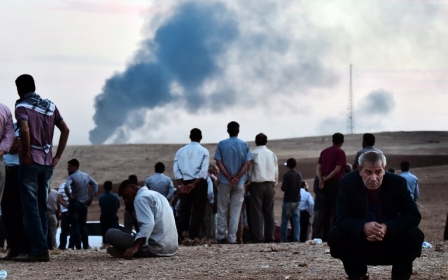As IS fighters make gains in Kobane, locals say 'next few hours' crucial
As Kurdish YPG and Free Syrian Army forces hold off IS fighters at Kobane, US and Turkey tussle over intervention

Smoke rises from an airstrike on the outskirts of Kobane on Thursday (AFP)
Published date: 13 February 2015 01:45 GMT
|
Last update: 9 years 2 months ago
As heavy street clashes and air strikes continued on Friday, locals in Kobane tell MEE that the Islamic State militant group battling the town for the past three weeks has made progress and the next few hours of fighting will be crucial.
After Kurdish forces repelled IS fighters back Thursday evening, IS returned Friday with more mercenaries and heavy weapons, Barzan Iso, a freelance journalist in the town told MEE midday on Friday.
“It’s not clear who’s winning. Without these air strikes, IS would occupy the city,” Iso said.
“[IS] have captured new streets and suburbs in Kobane. They are advancing towards the city center. The next few hours will be crucial,” Idris Nassan, senior spokesperson for the Kurdish fighters said by phone.
As the fighting raged on, the US continued to urge Turkey to join the fight against advancing Islamic State fighters undeterred by US-led air strikes.
In fighting that killed dozens, calls grew for ground action to support Kobane's beleaguered Kurdish defenders whose leadership see their resistance, alongside Free Syrian Army fighters, thus far as a victory.
After talks with NATO chief Jens Stoltenberg on Thursday, Turkish Foreign Minister Mevlut Cavusoglu said Ankara could not be expected to act alone.
"It's not realistic to expect that Turkey will lead a ground operation on its own," he said.
There has been disappointment in Washington and elsewhere that Ankara has yet to commit its well-equipped and well-trained forces to the fight against the militants, although some analysts like Thomas Pierret, lecturer in contermporary Islam and director of the University of Edinburgh's Centre for the Advanced Study of the Arab World, have noted the inconsistency of the US position on Syria.
In recent days, particularly as the US has sent Apache helicopters in Iraq, US commentators have raised the spectre, four weeks after the US-led air campaign against IS began in Syria, of mission creep.
"Just four weeks later, Obama is dropping more bombs on Syria than he ever did, in the course of a day, on Iraq. How did this happen? The way mission creep usually happens: It crept up on him," wrote Fred Kaplan, author of The Insurgents: David Petraeus and the Plot to Change the American Way of War, in Slate on Wednesday.
CNN's chief national security correspondent Jim Sciutto pointed out on Friday how the Syrian border town has become the focal point of US-led airstrikes.
Questions of mission creep aside, for Turkey, intervening militarily is a domestic double-sword: either the country can arm the Kurdish YPG forces battling the IS fighters in Kobane and risk weapons falling into the hands of PKK fighters whom the Turkish government have said are as much an enemy to the country as IS - although on Thursday, jailed PKK leader Abdullah Ocalan called for a speeding up of the Kurdish-Turkish peace process in light of the standoff in Kobane. Or the government can risk the growing anger of Kurds and their supporters who say Turkey's inaction is enabling a massacre
The death toll from ongoing pro-Kurdish protests in Turkey has risen to 31 after a man died after being injured in demonstrations in Turkey’s southeastern province of Diyarbakir on Friday. Another 360 people have been injured, Turkey's Interior Minister Efkan Ala told reporters.
The death toll from ongoing pro-Kurdish protests in Turkey has risen to 31 after a man died after being injured in demonstrations in Turkey’s southeastern province of Diyarbakir on Friday. Another 360 people have been injured, Turkey's Interior Minister Efkan Ala told reporters.
"The people in Kobane are our brothers and sisters," one protester told MEE contributors in Istanbul this week. "There will be a massacre if Turkey doesn’t step in, it is their responsibility and we are demanding they take it."
Turkey has said it will participate in the anti-IS coalition, but it wants the campaign to widen its scope and take on Syrian President Bashar al-Assad and the creation of a buffer zone to protect Turkey's security and house more than 1.5 million Syrian refugees, conditions Washington has so far rejected.
Two top US envoys - Retired general John Allen and US pointman on Iraq, Brett McGurk - met Thursday in Ankara with Turkish leaders seeking to win their NATO ally's support. US officials also announced that a joint US-Turkish military team will meet next week in Ankara to discuss the fight against the Islamist militants.
"There is no question that Turkey is well-positioned to contribute," in areas including military cooperation, US State Department spokeswoman Jen Psaki said, while stressing "it's not a situation where we are making demands".
Iran's Deputy Foreign Minister Amir Abdollahian, whose country is a close ally of the Syrian regime, said Tehran was in talks with Turkey on saving Kobane "and we hope it can play an important role".
Stay informed with MEE's newsletters
Sign up to get the latest alerts, insights and analysis, starting with Turkey Unpacked
Middle East Eye delivers independent and unrivalled coverage and analysis of the Middle East, North Africa and beyond. To learn more about republishing this content and the associated fees, please fill out this form. More about MEE can be found here.




